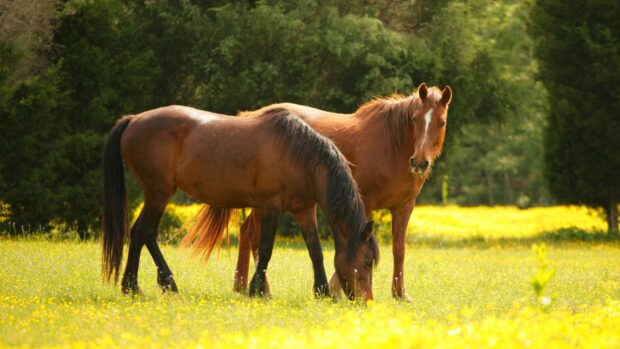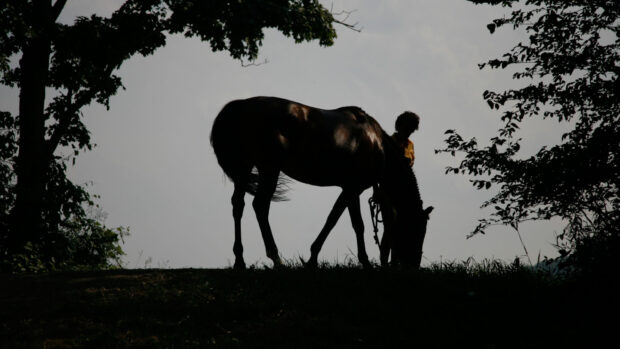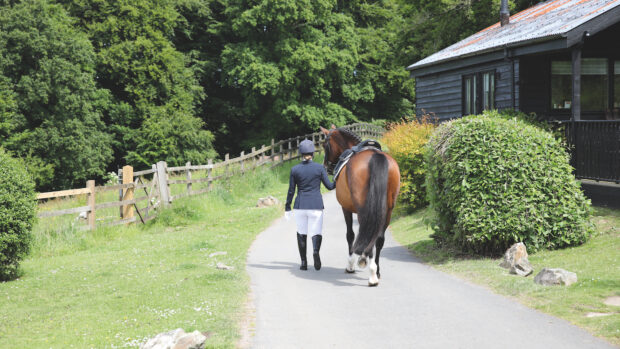A racehorse trainer who gave two of her horses a peaceful end at home having tried everything to give them happy lives says there are “far worse fates than death”.
Ted and Passato were put down on 28 July, and dual-purpose trainer Jo Davis told Horse&Hound the decision “broke me”.
“I’ve seen so many horses so let down by humans and if I’d thought for one second I could give those horses a good life until they died, [putting them down] wouldn’t even have been considered,” she said.
Jo explained that Passato, “the horse who did most for me in my career”, was injured, so he went to Jo’s mother for retirement.
“Her horse had died and the other one was on his own so I thought it was perfect,” she said. “She started telling me he was getting separation anxiety, and I thought, ‘Don’t be silly,’ but I used to go and get them in, and he’d go insane if he couldn’t see the other horse. He’d barge about and lose his mind. Mum kept him for five years because she adored him, but then he mowed her over. She’s 75, and I said, ‘We’ll have him back here’.”
Jo tried different fields but Passato ran back and forth along the fence so much, his chest bled. When he came in during the heatwave, he “climbed the walls, screaming and screaming”.
“I thought, ‘You can’t live like this,’” Jo said. “I loved and worshipped that little horse, and if I could have let him live out his days, I would have done.”
Ted had been sent to what Jo thought was a home for life, two and a half years ago, but she had a recent email saying he had bronced his rider off and they did not want to keep him.
Jo, who said the horse had always had potential to be sharp, took him back and put work into him, then sent him out hacking – and he came back on his own.
“[The rider] said she’d never sat anything like it,” Jo said. “Spinning, planting, running backwards, shaking. He didn’t know what he was doing until he fell over; he’d clearly gone, mentally, and I thought, ‘That’s my answer.’
“You feel like you’ve failed them by not being able to save them. But it’s the right thing.”
Jo added: “It’s our duty to give our horses the most stress-free life; we fail them when we keep them alive for our feelings.”
A life well lived
Welfare experts and vets have spoken in the past of the importance of a life well lived for horses, that quality of life far outweighs length, and that delayed euthanasia is a major welfare concern, and equine euthanasia should be considered a positive welfare option.
“I think people need to take responsibility, and there are a lot worse fates than death,” Jo said. “I won’t sugar-coat it; this broke me, my horses are my world. I’d have found every excuse but I thought, ‘I have to deal with this’. The horses came in and had food, and were given sedative and led out quietly one by one. It broke me but they’re in a better place now, and I truly believe that.”
Jo said she felt she had to post on Facebook as she believes there is a recession coming, and “people need to understand that there’s worse than death, and they need to do right by horses who are chronically lame, or skin and bone, or otherwise gone past the point of having a happy life, or dangerous ones they pass on because they can’t deal with them”.
“These things happen and it’s OK to feel rubbish, and to make this decision. It’s a good option, even if it feels like the worst one, and it’s done in a dignified manner and the horse knows nothing.”
She added: “Good night boys and Passato my old friend, I thank you from the bottom of my heart, you gave me so much and I owe you so much, I’m sorry.”
A British Horseracing Authority spokesman told H&H: “On some occasions, horses cannot be rehomed at the end of their racing career. On those occasions euthanasia may be considered the most humane outcome for a horse to prevent it falling into neglect or living an unsuitable lifestyle. These decisions are never taken lightly, but are an important part of responsible ownership.”
She added that there is guidance, introduced in 2020 as a recommendation from the Horse Welfare Board’s welfare strategy, to ensure euthanasia is only used in the right circumstances. This states that it should only be an option when all other options have been considered and euthanasia is in the horse’s best interests. It says that when possible, it should be at home or in “suitable surroundings”.
“For this reason we strongly recommend against unnecessary transport of horses for slaughter when euthanasia could be carried out at home,” she said. “It is about showing respect to the horse in return for the service he or she has given to their owner and connections, and about giving dignity to the horse at the end of its life.”
World Horse Welfare CEO Roly Owers told H&H: “We thought Jo’s post was a welcome, brave and honest account of the heart-breaking decision all horse owners need to be prepared to make to truly put the wellbeing of their horses first. Euthanasia can be the right choice to protect the welfare of a horse who is suffering mentally or physically, or who would likely suffer if passed onto someone else.
“Rehoming older horses, or ones that have health or behavioural issues, is not only challenging but a real gamble for that horse’s future wellbeing. More often than not it is the kinder and more responsible option to put a horse to sleep in familiar surroundings rather than to rehome them unwisely or too optimistically.
“This is an emotive issue, and any negative reaction to Jo’s decision is likely arising from a well-meaning but misguided belief that good welfare is about quantity rather than quality of life. Horses ‘live in the moment’ and providing them with good moments and minimising negative ones is a key aspect of providing them with a good life, which is a key aspect of responsible ownership. More information on end of life matters can be found our End of Life page.”
You may also be interested in…
Horse & Hound magazine, out every Thursday, is packed with all the latest news and reports, as well as interviews, specials, nostalgia, vet and training advice. Find how you can enjoy the magazine delivered to your door every week, plus options to upgrade your subscription to access our online service that brings you breaking news and reports as well as other benefits.




